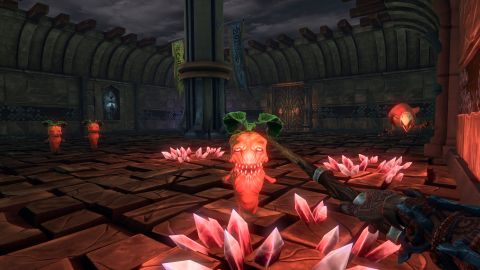Ziggurat is the videogame equivalent of a Jason Statham movie. It’s a meat-and-potatoes actioner with barely an original bone in its body, yet with snappy, crunchy combat and a handful of interesting ideas (mostly nicked from elsewhere, but rarely combined so enjoyably) it’s enormously satisfying and oddly charming with it.
You’ll walk away from it with a big smile on your face, the kind you get from an experience that isn’t exactly high art, but is comfortable within its own skin. It’s happy to simply get on with the business of entertaining its audience, and does so with no little skill.
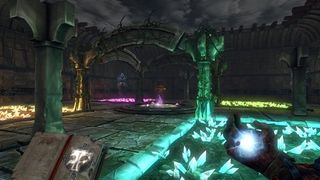
It comes from developer Milkstone Studios, which has form for smartly executed genre pieces, having enjoyed a prolific career making some of the most polished Xbox Live Indie Games around. Its Xbox One debut is a first-person roguelike, in which you battle through a randomly-generated dungeon five floors deep.
That doesn’t sound like a lot, but enemies get progressively tougher as you descend, and you only have a single life to reach the bottom. To even the odds you’re given an additional weapon at the start of each floor, and occasionally upon unlocking a magic box, or negotiating a tricky platforming challenge to reach a bonus chest.
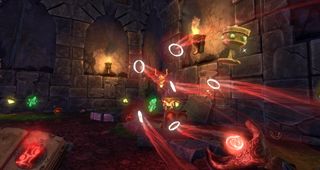
You’re a wizard of sorts, starting with a pea-shooter of a wand: its shots deal little damage, but its power source regenerates, so you’ve essentially got infinite ammo, though the fire rate slows when you’re running low on juice. But before long you’ll be wielding a staff or launching fireballs conjured by a magical tome, or using alchemy to power a grenade or a crossbow.
You can switch between these at any time, so when the mana gauge runs dry on one, you’ve usually got an alternative option, and pickups from dead beasts will refill your meters. You’ll vacuum up experience points from enemy corpses, too, and when you gain a level you’re given a choice of two boosts: some are temporary, but most offer permanent buffs.
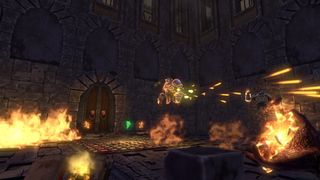
Meanwhile, shrine rooms allow you to gamble some of your health or mana by praying to the gods. Sometimes they’ll bestow you with gifts, but occasionally you’ll be punished. Losing a quarter of your health when you’re playing as the Sorcerer – a glass cannon compared with the all-rounder class you begin with – is no laughing matter, not least when you’re one room away from the boss’s chamber.
Combat is simplistic, and enemies often conform to fantasy archetypes, with a clutch of exceptions, including evil carrots and goo-spewing dodos. But it’s also fast and dynamic: if a room doesn’t have two or three levels connected by stairways, then it has destructible cover, and the breakneck pace means it’s easy to be picked off by even low-level minions.
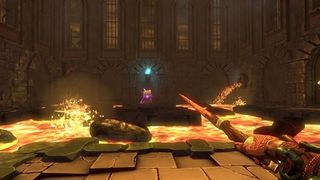
It’s challenging, then, but anyone who’s played a shooter before will be comfortable with what at first seems like an unusual arsenal: spells scatter like buckshot, delivering close-range damage, while a staff’s rapid fire is reminiscent of a machine gun. Nothing quite compares, however, to the brilliant Magma Rifle, which has the stopping power of a magnum.
The more you play, the more you’ll discover. One room might force you to fight in the dark; the next will restrict movement but your shots will hit twice as hard. There are cosmetic tweaks, too, with an old-school filter temporarily fattening up the pixels, and an inspired ‘next-gen’ gag which overdoses on chromatic aberration.
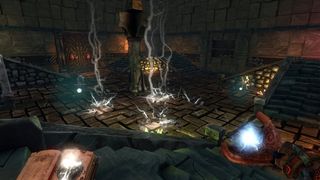
Just as you think it’s stopped giving you’ll fight a boss you’ve never seen before, unlock a new character class or a more powerful gun, or even stumble across a secret room not displayed on the map. Ziggurat’s an old-fashioned crowd-pleaser of a game, with no pretensions to being anything other than rollicking good fun. The Stath would surely approve.
